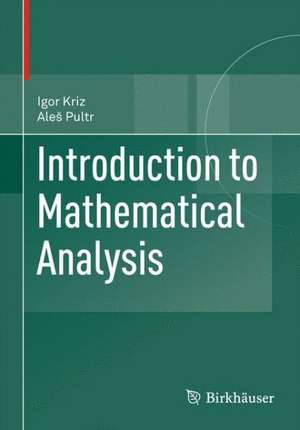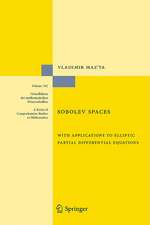Introduction to Mathematical Analysis
Autor Igor Kriz, Aleš Pultren Limba Engleză Paperback – aug 2013
Preț: 543.34 lei
Preț vechi: 639.23 lei
-15% Nou
Puncte Express: 815
Preț estimativ în valută:
103.97€ • 108.84$ • 86.03£
103.97€ • 108.84$ • 86.03£
Carte disponibilă
Livrare economică 15-29 martie
Preluare comenzi: 021 569.72.76
Specificații
ISBN-13: 9783034806350
ISBN-10: 3034806353
Pagini: 524
Ilustrații: XX, 510 p. 1 illus. in color.
Dimensiuni: 168 x 240 x 32 mm
Greutate: 0.86 kg
Ediția:2013
Editura: Springer
Colecția Birkhäuser
Locul publicării:Basel, Switzerland
ISBN-10: 3034806353
Pagini: 524
Ilustrații: XX, 510 p. 1 illus. in color.
Dimensiuni: 168 x 240 x 32 mm
Greutate: 0.86 kg
Ediția:2013
Editura: Springer
Colecția Birkhäuser
Locul publicării:Basel, Switzerland
Public țintă
Upper undergraduateCuprins
Preface.- Introduction.- Part 1. A Rigorous Approach to Advanced Calculus.- 1. Preliminaries.- 2. Metric and Topological Spaces I.- 3. Multivariable Differential Calculus.- 4. Integration I: Multivariable Riemann Integral and Basic Ideas toward the Lebesgue Integral.- 5. Integration II: Measurable Functions, Measure and the Techniques of Lebesgue Integration.- 6. Systems of Ordinary Differential Equations.- 7. System of Linear Differential Equations.- 8. Line Integrals and Green's Theorem.- Part 2. Analysis and Geometry.- 9. An Introduction to Complex Analysis.- 10. Metric and Topological Spaces II.- 11. Multilinear Algebra.- 12. Smooth Manifolds, Differential Forms and Stokes' Theorem.- 13. Calculus of Variations and the Geodesic Equation.- 14. Tensor Calculus and Riemannian Geometry.- 15. Hilbert Spaces I: Definitions and Basic Properties.- 16. Hilbert Spaces II: Examples and Applications.- Appendix A. Linear Algebra I: Vector Spaces.- Appendix B. Linear Algebra II: More about Matrices.- Bibliography.- Index of Symbols.- Index.
Recenzii
From the reviews:
“The book is intended as a second-year course of mathematical analysis for advanced undergraduate students. … The volume is addressed to undergraduate students seriously interested in mathematics and is accessible to students before they start taking graduate classes. Researchers in pure and applied nonlinear analysis will find interesting material in this volume.” (Teodora-Liliana Rădulescu, zbMATH, Vol. 1279, 2014)
“The authors included in their book some topics from topology, calculus of real functions of one and several real variables … elements of functional analysis, as well as some applications. … the present well written book is a valuable addition to the existing ones on similar topics. It can be used by graduate students in mathematics and researchers in mathematics and other areas … . The instructors can recommend the book as a supplementary material for their courses.” (S. Cobzaş, Studia Universitatis Babes-Bolyai, Math, Vol. 58 (4), 2013)
“The book is intended as a second-year course of mathematical analysis for advanced undergraduate students. … The volume is addressed to undergraduate students seriously interested in mathematics and is accessible to students before they start taking graduate classes. Researchers in pure and applied nonlinear analysis will find interesting material in this volume.” (Teodora-Liliana Rădulescu, zbMATH, Vol. 1279, 2014)
“The authors included in their book some topics from topology, calculus of real functions of one and several real variables … elements of functional analysis, as well as some applications. … the present well written book is a valuable addition to the existing ones on similar topics. It can be used by graduate students in mathematics and researchers in mathematics and other areas … . The instructors can recommend the book as a supplementary material for their courses.” (S. Cobzaş, Studia Universitatis Babes-Bolyai, Math, Vol. 58 (4), 2013)
Notă biografică
Igor Kriz studied in Prague, Czech Republic. He has lived in the United States since 1988 and been teaching at the University of Michigan since 1994. His main interests are geometry and algebraic topology. Aleš Pultr studied in Prague and has been teaching at the Charles University since 1961. His main interests are point-free topology, category theory and combinatorics. Both authors have taught numerous courses of mathematical analysis.
Textul de pe ultima copertă
The book begins at an undergraduate student level, assuming only basic knowledge of calculus in one variable. It rigorously treats topics such as multivariable differential calculus, the Lebesgue integral, vector calculus and differential equations. After having created a solid foundation of topology and linear algebra, the text later expands into more advanced topics such as complex analysis, differential forms, calculus of variations, differential geometry and even functional analysis. Overall, this text provides a unique and well-rounded introduction to the highly developed and multi-faceted subject of mathematical analysis as understood by mathematicians today.
Caracteristici
In a single text, the student gets a glimpse of a big picture
The treatment of mathematical analysis is rigorous and self-contained
Can be used not only as a textbook for a course but also as a reference book for lecturers in analysis or mathematicians and scientists in general ?
Includes supplementary material: sn.pub/extras
The treatment of mathematical analysis is rigorous and self-contained
Can be used not only as a textbook for a course but also as a reference book for lecturers in analysis or mathematicians and scientists in general ?
Includes supplementary material: sn.pub/extras













